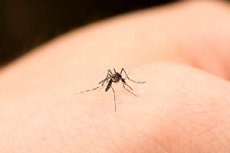
31 May 2024, 17:27
欧洲药品管理局(EMA)批准了欧洲大陆首个针对基孔肯雅病毒的疫苗,并警告称气候变化可能会加剧该疾病的传播。
基孔肯雅病,也称为 CHIK 热,是一种类似于登革热或寨卡病毒的疾病,会引起高烧和严重的关节痛,通常会让人虚弱无力,并且持续时间不一。
EMA 表示,症状还包括关节肿胀、肌肉疼痛、头痛、恶心、疲劳和皮疹。
EMA 授予了该疫苗的上市许可,这是该疫苗获得欧盟委员会授权使用前的最后一步。
Ixchiq 疫苗由奥地利 Valneva 公司研发,是一种粉末或注射剂,可在 18 岁以上人群接种后 28 天刺激中和抗体的产生。
疫苗接种后,疫苗效果可持续长达六个月。
欧洲药品管理局表示,CHIKV 以导致该疾病的病毒命名,“主要影响热带和亚热带地区的人们,大多数报告病例较多的国家……都位于中美洲和南美洲”。
该机构还补充道:“基孔肯雅病并非欧洲地方病,大多数患者是在欧洲大陆以外旅行时感染的。”
但该机构警告称,“已出现受感染旅客回国后传播病毒的病例,主要发生在南欧。”
欧洲疾病预防控制局表示,“由于气候变化,携带基孔肯雅病毒的蚊子传播,可能导致以前没有出现基孔肯雅病毒的地区出现基孔肯雅病毒病例”。
目前,尚无针对基孔肯雅病的许可治疗方法,该病在坦桑尼亚和莫桑比克的基马孔德语中意为“变得弯曲”。
世界卫生组织表示,CHIKV于1952年在坦桑尼亚首次发现,此后已在非洲、亚洲、美洲和欧洲的110个国家发现。
欧洲药品管理局补充道,巴西目前多个地区正经历基孔肯雅病疫情,2024 年第一季度报告病例超过 160,000 例。
该机构补充道:“基孔肯雅病等蚊媒疾病的增加是气候变化对健康影响的一个明显例子。”

